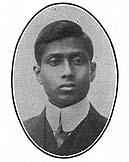Gadar!
Indian students at the UW, as elsewhere in the U.S., held a range of political views. Presumably a number considered themselves loyal British subjects and chose to focus on acquiring the education they had sought abroad. Others, such as Taraknath Das, worked actively to end colonialism in India. In some cases, if students had not been nationalists prior to immigration, their experience of discrimination in the U.S. helped intensify their self-identity and began to politicize them.
Das and certain other students became associated with a revolutionary movement founded by Har Dayal, a mercurial intellectual from Delhi who had come to the U.S. in 1911 after having been radicalized as a student in England. Dayal, who taught briefly at Stanford before resigning under pressure on account of his incendiary views, ranged the west coast inciting his countrymen to prepare for the inevitable revolution or Gadar which would liberate India. In 1913 he founded in Oregon the Pacific Coast Hindustani Association, which in the following year became the Gadar Party, headquartered in San Francisco. Gadarites included illiterate laborers and the educated elite, and British authorities considered Dayal the most dangerous of all North American revolutionaries. Arrested in March, 1914, on the basis of British intelligence, Dayal jumped bail and fled to Switzerland, whereupon the North American leadership of the Gadar party passed to others.
Besides Das (who never officially joined the party), it appears that at least four other U.W. students were associated with the movement. One was Guni Datta Kumar. Kumar had met Das while they were both in India, and immigrated to North America a year after Das. For the next several years he lived in Victoria, Vancouver and Seattle, attending the UW briefly in 1912. Like Das, Kumar founded a short-lived revolutionary periodical, the Swadesh Sevak, whose target audience was Sikhs in the British India army. Kumar and Das were collaborators in many agitation activities up and down the west coast prior to World War I.1
Another ardent nationalist was Vishnu Ganesh Pingle (also spelled Pingley), who was enrolled in the College of Engineering from 1912 to 1914. He cut short his studies and returned to his native country when the outbreak of World War I seemed to the Gadarites to provide the perfect opportunity to incite revolt in the Indian army. Pingle was arrested in possession of explosives in March, 1915 and was hanged on November 16, 1915, one of 28 men executed in connection with the Lahore Conspiracy Case. In India he is regarded as one of the nationalist “martyrs”, and this revolutionary pedigree is proudly claimed by his granddaughter, Rajni Patil, a former member of the Indian parliament.
A third student who was regarded as seditious by the British was Satya Deva, later known as Satya Deva Parivrajak (or Satyadeva Parivrajaka) whose birth name was Sukh Dayal.2 Arriving in the U.S. in 1905, he is said to have walked more than 2,300 miles on foot in this country before departing in 1911 for Europe, where he associated briefly with Indian revolutionaries before returning to India. He spent a year at the University of Chicago and at Oregon before enrolling in the UW in 1908-9. A member of the Arya Samaj Hindu reformist movement, Satya Deva authored 32 books of philosophy, religion, travel, and autobiography before his death in India in 1961. He supported Indian nationalist aspirations and participated in Gandhi’s non-cooperation movement.
|
|
|
"Tyee University of Washington " Vol. XIII, 1914 p.309 |
Surendra Nath Karr (or Kar) came to Seattle via Japan in July 1911 after having become involved in revolutionary activities. He received a Bachelor’s degree from the UW in 1915 and moved to Berkeley after graduation. There he served as General Secretary of the Hindusthan Association of America. Like Das, he was indicted in the Hindu-German Conspiracy case but was not tried due to ill health.3 The 1920 census gave his occupation as a “Lecturer-Journalist-Writer,” and besides running the Indian News Service in New York, founded by Gadarite Ram Chandra, he also wrote for The Nation and other publications in support of Indian causes. Karr eventually died in Germany.
1. Tapan K. Mukherjee, Taraknath Das: Life and Letters of a Revolutinary in Exile, (Calcutta: National Council of Education, Bengal, 1998), 11-12, 27.
2. Prabha Chopra and P.N. Chopra, eds., Indian Freedom Fighters Abroad: Secret British Intelligence Report (New Delhi: Criterion Publications, 1988), 150.
3. Matthew Erin Plowman, “Irish Republicans and the Indo-German Conspiracy of World War I” New Hibernia Review 7:3 (Autumn 2003), 100.
